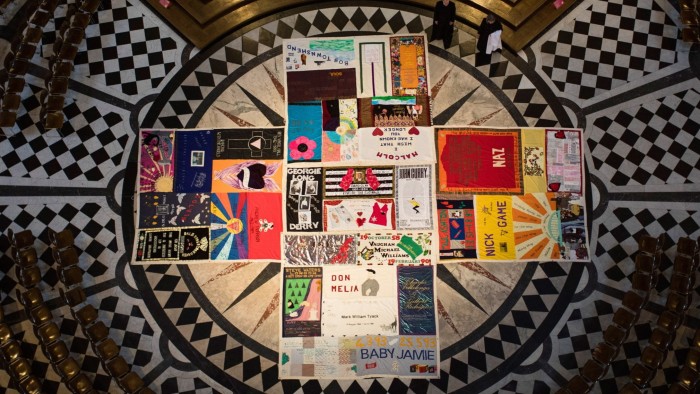Unlock the Editor’s Digest for free
Roula Khalaf, Editor of the FT, selects her favourite stories in this weekly newsletter.
A floral panel for Andrew, 1971-93. A rocket trailing bright fire past stars and planets for Jacques Buisson, 1945-86. An empty cot for Baby Jamie, March 4-May 25 1993.
These are all designs on textile panels made for the UK Aids Memorial Quilt by the lovers, friends and family of those who have died from Aids since the late 1980s. The project has never yet been displayed in full because of its size — the panels have been combined into 42 large quilts, each 12 feet (3.7 metres) squared — but it will be laid out almost in its entirety on the floor of the vast Turbine Hall at Tate Modern in London on June 12-16.
The moment could not be more pointed. The Trump administration has gutted USAID, which ran HIV-prevention projects and provided medication to those with HIV/Aids around the world. Bill Gates has accused Elon Musk of “killing the world’s poorest children” for his part in the cuts. The UK is cutting its own aid budget from 0.5 per cent of gross national income to 0.3 per cent from 2027.
The display has been in train since before these cruelties. Author Charlie Porter, who initiated it by writing to Tate’s director in July 2024, says that “always, the time is now” to remind the world that Aids is still with us. “There’s something about the quilt that cuts through,” he says, “and tells these individual stories of loss, sadness, grief, longing, desperation — story after story after story, all stitched together.”
When I saw the quilt partially displayed in London in 2021, there was a constant tug between grieving the lost, admiring the panels’ artistry, passion and wit (one for Psycho’s Anthony Perkins had a shower curtain being slashed by a fabric knife) and feeling cold, consuming fury at society’s indifference. The quilt “blurs the lines between art and activism”, says Elliot Gibbons, curator of the project. I felt that: it suffuses and it motivates.
Gibbons says the Turbine Hall, which has previously hosted Louise Bourgeois’s nine-metre-high steel towers and Ai Weiwei’s 100mn ceramic sunflower seeds, is the perfect space “to capture the scale and immensity of the project”. By putting it on a par with these vast ambitions, it endorses the quilt’s artistry while highlighting the magnitude of its purpose.
The first Aids Memorial Quilt emerged from the Names Project, which started in San Francisco and encouraged people to make memorial panels. The US Aids Quilt, displayed for the first time on the National Mall in Washington in 1987, now has 50,000 panels and weighs 54 tonnes. The British version was inspired by this, says Siobhán Lanigan of the UK Aids Memorial Quilt Partnership. The organisation is trying to raise £1.5mn for a three-year project of conservation, storage and display.
“We want to get [the UK quilt] out into the world and seen and conserved and looked after and generally used in a way that is celebratory and positive and an act of remembrance,” says Lanigan, who used to work at the London Lighthouse, a centre set up for people with HIV in 1988 which held quilting workshops. But she adds that the quilt is also a warning, “which feels a bit more pertinent in the current climate, because things seem to be going backwards” for people living with HIV.
The world which gave birth to the quilt has changed immeasurably in some ways. Equal marriage is legal in 38 countries. Homophobia is seen as socially unacceptable in many more, although transphobia is gaining worrying currency. Medicine has made HIV a manageable condition — those receiving treatment live long and healthy lives. Every morning I take Prep, a small blue pill which prevents me from getting HIV — a gift unimaginable to Andrew or Jacques. But all progress is reversible. Indeed, some seem determined to reverse it.
Porter calls the quilt “a plea for compassion” for those who have died, those who are living with HIV but face stigma, and for all those who are marginalised and demonised by society. To me, the quilt is also a cry for action, to do whatever we can to fight HIV/Aids in the UK and around the world — this year, this month, today, now.




